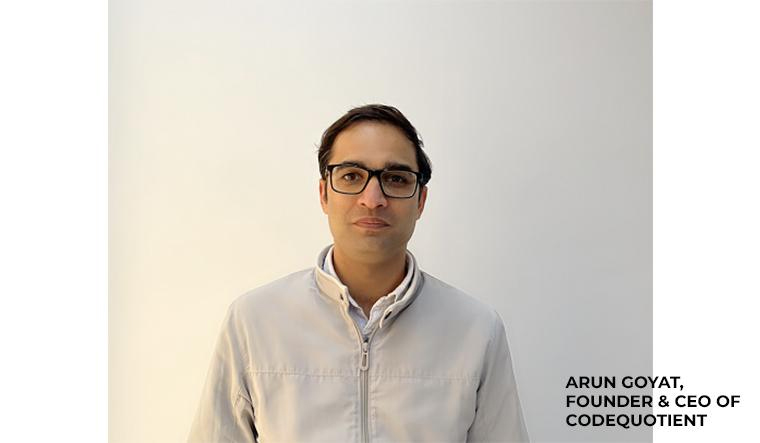In a relatively non-existent Edtech segment that started shaping up only a decade ago, CodeQuotient has come a long way in a short time. With more than 17,000 student users and associations with 50+ colleges, CodeQuotient is revolutionising the legacy of education pedagogies. CodeQuotient identifies itself as a learning and career platform that bridges the gap between formal education and the Indian IT job market.
We indulged in a candid conversation with CodeQuotient’s Founder & CEO, Arun Goyat, to discuss their business and plans. Let’s get straight to it, then.
1. How are the admissions looking like this year? What programs do you think/witness are the most in-demand on your platform?
We are seeing a surge in the admissions for our placement-oriented flagship course called the SuperCoders program. Yet, these days, with the colleges reopening in the offline mode, students are a bit preoccupied with adjusting timings for the course workload.
2. What's the gender preference ratio for programs?
We do not follow any such practices and do not have any ratio for gender preference. Therefore, anyone who clears our process, irrespective of their gender, can participate in the program.
But we have noticed that the female participants must be managed differently during placements since they have a different set of considerations.
3. Are you going to introduce any new programs this year? If so, then tell us about it
As part of our diversification strategy for clients, we've unfolded options of various specialisations for our students. The first two months in the program are common for everyone and cover the fundamental concepts of Computer Science. The later months will cover the specifics as follows:
· Advance DSA
· C++
· React
We help prepare students on employer company stack as a practice, and we’re planning to develop more such specialisations. However, students at CodeQuotient need to prove their mettle and earnestness during the first two months to be eligible for any specialisation from the third month onward.
4. CodeQuotient Academy has plans to tie up with four more universities this year. Tell us about your vision to enable tech in universities. Also, what are your thoughts on students who want to opt for tech-based programs in tier 2/3 cities?
Hiring engineering talent has a lot of challenges associated with it. Even the product technology companies have acknowledged the problem. As a result, industry experts need to look elsewhere for talent.
CodeQuotient is planning to work on the grass-root level of such problems. For example, we’re trying to admit more students from programs like BCA, BSC.IT, MCA, etc., so that they can learn and engage using industry sponsorships through scholarships and stipends.
CodeQuotient takes pride in setting the following USPs:
· Performance-based fee waiver after the first year.
· Opportunity to earn along with learning.
· Learning practical skills during the degree courses and implementing the same in a corporate setting.
These steps will empower students to learn to code while they’re still studying. It will also benefit the companies as they can identify and sponsor great talents.
Companies can associate with smarter talents by investing in long-term talent building. Those students will be a valuable asset to the company in the future.
5. As per a report, edtech in India is trying to go the SAAS way to conquer the global market. How do you view the future of the edtech sector with things coming to normal now?
I see nothing wrong with going the SAAS way. Every company wants to invest its time and energy in customers who pay. Everyone wants to be smart about customer acquisition.
At CodeQuotient, for us, tech is very good enablement. It can measure the success matrix of students and present it to potential companies. As a result, companies can make informed decisions on hiring sustainable resources.
However, in my opinion, online tutoring is not sustainable. I still want to be able to interact physically for work and lectures to get the best out of students.
There will be consolidation, and eventually, everyone will come around to imparting work-related practical skills and care out successful careers.
6. Tell us about the growth of your platform since its inception and your further expansion plans
We’ve had an exciting journey so far. I liked the old work style where I would conduct offline classes in the workshop mode with selected students. Back in the time, I could see students’ progress clearly and could advise students on course corrections.
With COVID, we went online, and that worked out pretty well too! But, I knew that success was temporary. For instance, the first two batches were roaring successes—we got excellent placement conversions, students were happy, and companies were thrilled to find talent.
But, after some time, online started to reach its peak fatigue. As things started going back to normal and campuses resumed, the students lost sincerity. Only the motivated ones did well in the online batches. The rest had difficulty prioritising online with offline of their campus etc.
We immediately realised this problem and took action. First, we approached progressive institutions to enable CodeQuotient academics within their campus. Then, we teamed up with partner institutes to deliver a potent combination of practical training and workshops.
We started with Haryana and are now planning to extend to PAN India. Our concept is application-based and will help students learn the practical part of every theoretical concept.
We’re very thrilled about the future of our platform. We’re all set to offer unparalleled value to all stakeholders—students, academic partners, and companies looking for fresh talents.




